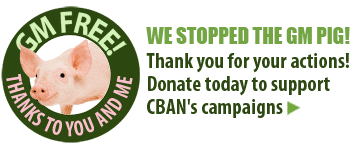Enviropig
The genetically modified (GM or genetically engineered) pig called “Enviropig” has been shut down thanks to CBAN and your action. Thanks to your support and actions we have stopped the GM Pig!
June 22, 2012 – Press Release: GM “Enviropigs” Meet Dead End: Remaining GM pigs euthanized at the University of Guelph
April 2, 2012 – Press Release: Genetically Modified Pig Shelved
In 2012, the hog industry group Ontario Pork stopped funding the GM pig research at the University of Guelph in Ontario. The university has now closed down its active research and ended its breeding program of GM pigs. The GM pigs have been destroyed. The pig was engineered with genetic material from a mouse to reduce phosphorous in its feces. It could have become the first GM food animal approved in the world.

Lucy Sharrat, CBAN Coordinator and Paul Slomp, Youth Vice-President, National Farmers Union speak at a Press Conference April 2, 2012 breaking the news of the end of the GM pig. Click here to watch the Press Conference on YouTube.
April 3, 2012 “I had the feeling in seven or eight or nine years that transgenic animals probably would be acceptable. But I was wrong. It’s time to stop the program until the rest of the world catches up” – Dr. Cecil Forsberg, “inventor” of Enviropig. Read the full New York Times article.
Summary
The goal of the GM Enviropig™ was to provide intensive livestock operations (factory farms) with a product to reduce the amount of polluting phosphorous they produce. Phosphorous from animal manure is a nutrient for plants that becomes a pollutant if there is too much of it for crops to absorb, and the excess runs off into streams and lakes.
There are already many solutions to this problem including reducing the number of pigs raised in one place, changing feed ingredients, trucking liquid manure longer distances, dry composting manure, or expanding the area of land for spreading manure. Additionally, there is already the cost-effective, simple technological fix of a phytase supplement that can be added to hog feed.
Enviropig™ was genetically engineered to produce the enzyme phytase in its salivary glands to enable more effective digestion of phytate, the from of phosphorus found in pig feed ingredients like corn and soybeans. Scientists inserted a transgene sequence that includes an E-coli bacteria phytase gene and a mouse promoter gene sequence.
In February 2010, Environment Canada granted approval to the University of Guelph for the reproduction and exportation of Enviropig™. Health Canada could approve Enviropig™ for human consumption at any time.
Background
CBAN Report: Enviropig: Genetically Engineering Pigs to Support Industrial Hog Production, 2010
- What is Enviropig™?
- Is Enviropig™ An Environmental Solution?
- Who “Created” and Owns Enviropig™?
- Is Enviropig™ Safe?
- When will Enviropig™ be on the market?
- Do Farmers Need Enviropig™?
Article: “Enviropig™: A piggy you hope to never meet at the market”, Common Ground magazine, by Lucy Sharratt, June 2010.
February 9, 2011 – Press Release : Rally to Stop University of Guelph’s Genetically Modified Pig: Students, Farmers and Consumers Join Together
October 7, 2010 – Lucy Sharratt, CBAN Coordinator, and Sean McGivern, Regional Coordinator of the National Farmers Union Ontario debated Rich Moccia VP Research, University of Guelph and Dr. Cecil Forsberg, University of Guelph “creator” of Enviropig. Check out the University of Guelph and CBAN: Answers to questions that we ran out of time to address at the debate “Enviropig: Helpful or Harmful?”, hosted by the Critical Knowledge Collective at the University of Guelph.

Lucy Sharratt, CBAN Coordinator with Sean McGivern, Regional Coordinator of National Farmers Union Ontario debating Rich Moccia VP Research, University of Guelph and Dr. Cecil Forsberg, University of Guelph “creator” of Enviropig, October 7 2010, University of Guelph.
March 2010: The National Farmers Union of Ontario passed a resolution against Enviropig at their March 20, 2010 AGM: “THEREFORE BE IT RESOLVED that the NFU oppose the commercial production of the Enviropig in Canada and request that Ontario Pork and OMAFRA withdraw support for the Enviro Pig and U of Guelph shut down the project immediately. Further, that NFU-O request that these financial resources be redirected to research that fits the real needs of hog producers in Ontario and Canada.” Read the full resolution here.
Livestock breeding in the hands of corporations, Article, Seedling, January 2008.





